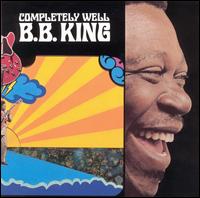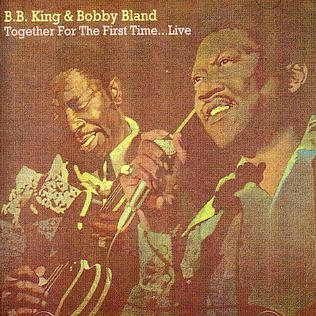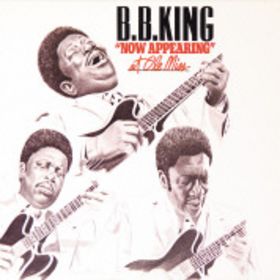
Riley B. King, known professionally as B. B. King, was an American blues guitarist, singer, songwriter, and record producer. He introduced a sophisticated style of soloing based on fluid string bending, shimmering vibrato, and staccato picking that influenced many later blues electric guitar players. AllMusic recognized King as "the single most important electric guitarist of the last half of the 20th century".

Live at the Regal is a 1965 live album by American blues guitarist and singer B.B. King. It was recorded on November 21, 1964, at the Regal Theater in Chicago. The album is widely heralded as one of the greatest blues albums ever recorded and was ranked at number 141 in Rolling Stone's 2003 edition of the 500 Greatest Albums of All Time list, before dropping to number 299 in a 2020 revision. In 2005, Live at the Regal was selected for permanent preservation in the National Recording Registry at the Library of Congress in the United States.

Completely Well, released in 1969, is a studio album by the blues guitarist B. B. King. It is notable for the inclusion of "The Thrill Is Gone", which became a hit on both the R&B/soul and pop charts and which earned him a Grammy Award for Best Male R&B Vocal Performance in 1970.

B. B. King (1925–2015) was an American blues musician whose recording career spanned 1949–2008. As with other blues contemporaries, King's material was primarily released on singles until the late 1950s–early 1960s, when long playing record albums became more popular.

Indianola Mississippi Seeds is B. B. King's eighteenth studio album. It was released in October 1970 on ABC Records on LP and May 1989 on MCA Records on CD. On this album B. B. King mixed elements of blues and rock music. Producer Bill Szymczyk decided to follow up on the success of the hit "The Thrill Is Gone" by matching King with a musical all-star cast. The result was one of King's most critically acclaimed albums and one of the most highly regarded blues crossover albums of all time.

Live in Cook County Jail is a 1971 live album by American blues musician B.B. King, recorded on September 10, 1970, in Cook County Jail in Chicago. Agreeing to a request by jail warden Winston Moore, King and his band performed for an audience of 2,117 prisoners, most of whom were young black men. King's set list consisted mostly of slow blues songs, which had been hits earlier in his career. When King told ABC Records about the upcoming performance, he was advised to bring along press and recording equipment.

Playin' with My Friends: Bennett Sings the Blues is a 2001 album by Tony Bennett featuring duets with notable vocalists.

Guess Who is a studio album by B. B. King. It was released in 1972 by ABC Records.

B.B. King in London is a nineteenth studio album by B.B. King, recorded in London in 1971. He is accompanied by US session musicians and various British rock- and R&B musicians, including Ringo Starr, Alexis Korner and Gary Wright, as well as members of Spooky Tooth and Humble Pie, Greg Ridley, Steve Marriott, and Jerry Shirley.

Makin' Love Is Good for You is a 2000 album by American blues musician B. B. King, his thirty-eighth studio album.

Blues on the Bayou is the thirty sixth studio album by B.B. King, released in 1998.

Live at San Quentin is a 1990 live album by blues guitarist B.B. King performed at San Quentin State Prison in Marin County, California.

Live & Well is a live and studio album by B. B. King, released in 1969. The side A contains five tracks recorded "live" at the Village Gate, in New York City, and the side B five titles recorded in 'The Hit Factory' also in New York.

L.A. Midnight is the twentieth studio electric blues album by B.B. King released in 1972. It features two extended guitar jams with fellow guitarists Jesse Ed Davis and Joe Walsh. It also features Taj Mahal on harmonica and guitar.. "Can't You Hear Me Talking To You" also features Davis on guitar.

Together for the First Time... Live is a 1974 blues album by singer Bobby Bland and guitarist B. B. King. The duo later recorded Bobby Bland and B. B. King Together Again...Live. Bland and King toured together extensively in the 1970s and 1980s, which did much to keep their careers alive during a period of otherwise popular decline for the blues genre.

Now Appearing at Ole Miss is a live album by B. B. King, recorded in 1979 and released as a double album on MCA Records in 1980. The live recordings were augmented with overdubs, most notably with percussion instruments. This has been criticized by reviewers as making the album stale, and it is widely regarded as B.B. King's weakest 'live' album. One notable feature, is that the album contains the first use of the bass style of playing known as "slap" by Russell Jackson, who would go on to play in the posthumous "B.B. King Experience Band" with another B.B. King band veteran James "Boogaloo" Bolden.

The Best of the Early Years is a 2007 Blues compilation album by B.B. King. This "Best of" collection was created from master recordings from King's works from the 1950s and 1960s.
"How Blue Can You Get" is a blues song first recorded by Johnny Moore's Three Blazers in 1949. It is a slow twelve-bar blues that jazz critic Leonard Feather and his wife, Jane Feather, are credited with writing. The song has been recorded by several blues and other artists. It was a hit for B.B. King in 1964 and became a staple of his live shows.

Hot Damn! is a 1997 blues album by Billy Lee Riley. The album was nominated for a Grammy.

Ladies and Gentlemen... Mr. B.B. King is a box set compilation album by B. B. King. It traces King's career from his first singles for Bullet Records in 1949 to material on his last recorded album in 2008. Crowdfunded by Pledge Music in 2012, it was available in a full ten-disc box exclusive through Amazon.com, and a four-disc "highlights" box available everywhere else. People who pledged money also got a digital copy of the out-of-print 1975 album Lucille Talks Back. Both versions of the box are physically out of print; the four disc edition is bundled along with Lucille Talks Back digitally, although this version removes King's first single.


















